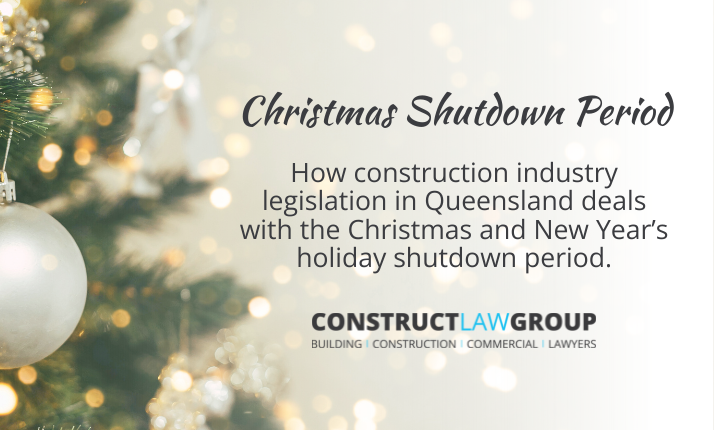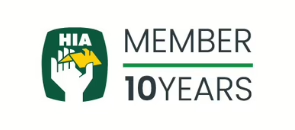The Christmas and New Year’s holidays are fast approaching. Unfortunately, contractual deadlines that fall on or around this time are often missed, which can result in a significant financial burden.
Below we explain how construction industry legislation in Queensland deals with the Christmas and New Year’s holiday shutdown period (Christmas Shutdown Period) and we offer some simple suggestions to help avoid unwanted surprises and undue stress during that period.
The Building Industry Fairness (Security of Payment) Act 2017 (BIF Act), amongst other things, provides an entitlement to progress payments, establishes timeframes and procedures for making and responding to payment claims, and enables the use of a statutory charge in favour of contractors to secure money for the work they do. The majority of the timeframes imposed by the BIF Act refer to “business days”. Notably, some strict timeframes relate to:
- when payment claims can be made by contractors;
- when principals or superior contractors must respond (provide a payment schedule) to a payment claim from a contractor;
- the adjudication process;
- the commencement of court proceedings; and
- securing payment with a subcontractors’ charge.
The BIF Act accommodates the Christmas Shutdown Period in Schedule 2, which provides that a business day does not include:
- a Saturday or Sunday; or
- a public holiday, special holiday or bank holiday in the place in which any relevant act is to be or may be done; or
- any day occurring within any of the following periods—
- 22 to 24 December;
- 27 to 31 December;
- 2 to 10 January.
This definition means that, for the purpose of the BIF Act, the period between Sunday, 22 December 2024 and Friday, 10 January 2025 are not business days and are not included in calculating due dates.
Helpfully a definition of “business day” was recently included in the Queensland Building and Construction Commission Act 1991 (QBCC Act) consistent with the BIF Act definition above. However, this definition of business day only applies to the void payment provisions in Part 4A of the QBCC Act and not to any other provision in that Act that refers to a business day. Care should therefore be taken when considering time periods in the QBCC Act.
Christmas Shutdown Period in Contracts
Each contract may vary as to how the Christmas Shutdown Period will affect timeframes imposed on the parties, however we have set out below a few key things to look for.
Days/Business Days/Working Days
Review your contract to determine whether a timeframe refers to “days” or “business days” or “working days”. Contracts may have a definition section at either the beginning or the end of the general terms and conditions which may define what “business day” or “day” means.
Delays and Extension of Time
Building contracts often include a clause that allows builders to request a reasonable extension of time due to certain delays to the performance of the works (EOT clause). An EOT clause may also set out the grounds of delay, often referred to as claimable delays or qualifying causes of delay.
The EOT clause will usually only state that the Christmas Shutdown Period can be claimed as a delay if it was not reasonably foreseen when signing the contract that works would be ongoing during this time. If your contract does not provide for the Christmas Shutdown Period and it becomes apparent that works will be ongoing over this period, you should ensure that extension of time claims are given promptly and strictly in accordance with the contractual timeframes.
Many contracts now also include force majeure provisions that expressly address extensions of time and related costs for work affected by COVID-19 and related legislative matters or site-specific WHS policy requirements. Again, you should ensure all notifications are given promptly and strictly in accordance with the contractual timeframes.
Enterprise Bargaining Agreement / Industry Awards
It is also important for construction businesses to review what relevant construction industry award or enterprise bargaining agreement, if any, is in place. These may require employees to take time off during the Christmas Shutdown Period or during certain public holidays.
This should be taken into consideration when preparing work programs or negotiating building periods under a building contract.
Checking your Company’s Registered Office/Emails
While your office may be closed, this does not prevent another party from issuing a payment claim or payment schedule or other notices under the contract.
We strongly recommend that someone from your business is responsible for regularly checking your company’s registered business address, principal place of business and emails (especially those noted in the contract for service of notices) for any payment claims, payment schedules, adjudication applications or other contractual or statutory notices.
When in doubt, we recommend you obtain legal advice about how your contract and legislation is to be interpreted during the Christmas Shutdown Period.
Our team here at Construct Law Group can assist. Call us on (07) 3139 1874 or email us at info@constructlaw.com.au.
This article is provided for general information and educational purposes only and does not constitute legal advice. Readers should obtain appropriate independent legal advice based on their own specific circumstances.



